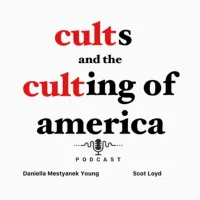View Transcript
Episode Description
In this special episode, Daniella Mestyanek Young ("Knitting Cult Lady") speaks with Dr. Bryan Pitts, Assistant Director of UCLA's Latin American Institute, about the Brazilian military dictatorship (1964–1985) and how studying Brazil's political history can help Americans understand current threats to democracy. They compare U.S. and Brazilian political systems, the cultural myths that obscure inequality (the "American Dream" vs. Brazil's "racial democracy"), and the interplay between religion, class, and authoritarianism. The discussion explores how political elites, class structures, and the military shaped Brazil's dictatorship and its fall, how the U.S. normalizes corruption through legality, and why Americans struggle to recognize creeping authoritarianism. The episode ends with reflections on community resilience, the dangers of individualism, and lessons from Brazil on defending democracy.
Dr. Pitts' Book:
Daniella's Links:
Preorder for Culting of America: The Culting of America PRE-SALE (SHIPS BY JANUARY 20, 2026) – Knitting Cult Lady
Daniella Mestyanek Young's book:
-
Uncultured Autographed:
Connect with Daniella on social media
Other Podcasts
Daniella's other podcast: Hey White Women
Scot's Socials
TikTok: @thescotloyd
Youtube: https://www.youtube.com/@thescotloyd
Haley's Tiktok
Key Takeaways
-
U.S. comparisons to Nazi Germany miss nuances—Latin American dictatorships, especially Brazil's, offer more relevant parallels.
-
Brazil's 1964 coup was not purely CIA-driven but enabled by U.S. encouragement and anti-communist ideology.
-
The Brazilian dictatorship's fall was driven by local politicians regaining influence and citizens mobilizing for democracy.
-
Brazil's political class and military were both hereditary systems that reinforced inequality and control.
-
Corruption in Brazil was often criminalized campaign funding—whereas in the U.S., "legal corruption" (e.g., Citizens United) plays a similar role.
-
National myths—America's "classless society" and Brazil's "racial democracy"—mask systemic inequality and prevent honest reckoning.
-
Daniella and Bryan compare cult structures to political systems: authoritarian control thrives on isolation, hierarchy, and sacred assumptions.
-
Bureaucracy and decentralization (local politics, paperwork, institutional rules) often protect democracy better than charismatic leadership.
-
The Brazilian opposition's shift from abstract "save democracy" rhetoric to focusing on people's material needs (poverty, inequality) was pivotal to defeating authoritarianism.
-
Americans may not recognize creeping dictatorship because they lack collective memory of one; Brazil's experience offers a warning and a roadmap.
-
The U.S. military's apolitical stance may protect against coups but limits civic intervention when democracy erodes.
-
Building community and mutual aid networks is crucial as a counter to isolation and authoritarian individualism.
-
Both guests reflect on how growing up in cults or authoritarian systems gave them insight into manipulation, obedience, and ideological rigidity.
-
Authoritarianism can appear on the left or right; unquestioning certainty is itself cult-like.
-
Brazilians unified quickly to defend democracy after Bolsonaro's attempted coup—contrasting sharply with U.S. responses after January 6th.
-
Americans over-trust institutions and underestimate the need for civic defense of democracy.
-
Brazil's "relative democracy" under dictatorship reveals how regimes justify authoritarian control in the name of "protection."
-
Structural inequality, not individual failure, drives poverty—an insight both guests developed from missionary childhoods.
-
Both guests emphasize that understanding other nations' histories is vital to preventing tyranny at home.
Chapters
00:00 Introduction to the Conversation
02:18 Personal Backgrounds and Cultural Insights
11:40 Understanding Brazil's Military Dictatorship
18:33 The Role of the Political Elite in Brazil
24:25 Class and Military Dynamics in Brazil and the US
29:06 Sacred Assumptions and the American Dream
30:28 The Decline of the American Dream
31:41 Comparing Dictatorships: The U.S. and Latin America
35:07 Cultural Diversity and National Identity
38:37 Birthright Citizenship and Its Implications
42:48 Political Maneuvering During Dictatorship
52:04 Lessons from Brazil's Political History
55:03 The Role of Community in Political Change
56:01 Introduction to Authoritarianism and Democracy
58:33 The Role of Institutions in Protecting Democracy
01:01:36 Military's Role in American Politics
01:04:22 Cult Dynamics in Military and Academia
01:07:19 Experiences of Extremism and Authoritarianism
01:10:15 The Importance of Community and Resistance
Produced by Haley Phillips, Meghan Picmann, and Lizy Freudmann
